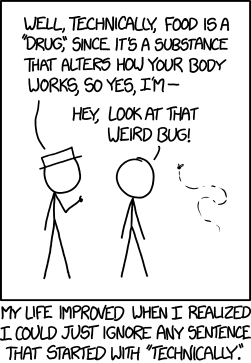
Almost everyone has heard, at some point in their lives, the saying “a tomato is a fruit, not a vegetable”. It’s one of those things that sounds clever, but once you really start to think about it, once you start to do some research on it, it starts to unravel really quickly. I want to talk about tomatoes today and how the saying “a tomato is a fruit, not a vegetable” is just plain misleading.
The first thing I want to point out is when people say “a tomato is a fruit, not a vegetable”, they’re conflating two different terms from two different fields, fields that can’t be reconciled. The Venn diagram above illustrates this quite nicely. The scientific field of botany (aka plant biology) has the term “fruit” (which laymen approximate to mean “the seed-bearing part of the plant”), but not the term vegetable. So in botany, you can say a tomato is a fruit. Period. Full stop. Because science doesn’t have the term “vegetable”.
On the flip side, the non-scientific field of cooking has both terms “fruit” and “vegetable”. And in cooking, a tomato is definitely a vegetable, not a fruit. It’s not sweet like apples and oranges (yes, I compared them). You don’t serve it in a fruit pie or a fruit salad, like you would with actual fruits. No, you generally serve it in garden salads, with other vegetables, or salsas, or savory foods. No, a tomato is definitely a vegetable. As are eggplants, cucumbers, and squashes. Which are also fruits in botany, but are vegetables in cooking. But no one ever says “an eggplant is a fruit, not a vegetable”. (Okay, almost no one.)
Besides, cooking is a non-scientific field. (In the sense that cooking isn’t done in research labs with peer reviewed papers, carefully designed experiments, and standardized terminology and taxonomy. Not in the sense of “cooking is an art, baking is a science”, another terribly misleading statement, but that’s another blog entry.) The term “vegetable” is culture-dependent and ultimately just really arbitrary. Everyone agrees that lettuce and spinach are vegetables. Most people agree that carrots and corn are vegetables. Are potatoes and rice vegetables? It depends on who you ask. What about garlic and chili peppers? Are herbs and spices vegetables, or are they separate categories altogether? It’s like asking whether a hot dog is a sandwich. It has all the criteria of a sandwich, but a lot of people would hesitate to call a hot dog a sandwich. (Try reading the Wikipedia articles for hot dog and sandwich. It actually gets kind of confusing. But I digress.)
So next time someone tells you “technically, a tomato is a fruit, not a vegetable”, you can tell them “technically, any field that classifies a tomato is a fruit doesn’t have the term ‘vegetable'”.

Besides, this was settled by our courts over a century ago. The courts acknowledge that in botany, a tomato is a fruit, but decided that in cooking, a tomato is a vegetable, specifically because it’s used in savory dishes rather than sweet dishes.
Then again, the government also decided that ketchup is a vegetable. See what I mean about totally arbitrary?